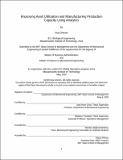Improving asset utilization and manufacturing production capacity using analytics
Author(s)
Ghersin, Noa.
Download1191622985-MIT.pdf (2.723Mb)
Other Contributors
Sloan School of Management.
Massachusetts Institute of Technology. Department of Mechanical Engineering.
Leaders for Global Operations Program.
Advisor
Jung-Hoon Chun and Nikolaos Trichakis.
Terms of use
Metadata
Show full item recordAbstract
Industrial organizations have increasingly invested in IoT technologies to monitor, control, identify faults in, and optimize operations. With increasing competition, a push to lower manufacturing costs, and pressure to create 'wow' moments for passengers, and in alignment with enterprise vertical integration strategies, airplane interiors manufacturers like Boeing's Interiors Responsibility Center (IRC) are looking to leverage IoT technology to transform not only what they manufacture but also how. This study seeks to understand the potential for analytics in increasing production manufacturing capacity in Boeing's IRC. Our analysis is driven from personnel interviews, observational time studies, review of historical machine data, and value stream mapping. We establish that replacing human-dictated job allocations in the CNC router workstation with an analytical allocation tool built using mixed integer programming techniques can increase manufacturing production capacity and reduce schedule losses, thereby increasing Total Effective Equipment Performance (TEEP). Moreover, data-based job allocations offer a 56-fold decrease in workload variance among machines, thereby establishing a fairer work allocation scheme associated with increased job satisfaction among 72% of employees. A discrete event simulation of operations in the IRC's CNC router workstation was built and tested across ten test days for further analysis of efficiencies gained from the job allocation tool in a realistic context. The simulation, which considers equipment and personnel requirements, supporting activities such as material handling, and the factory's physical layout, revealed that as-is operations in the CNC router workstation are unable to meet demand. Moreover, a comparison of workstation operations with and without the data-based job allocations tool via numerical experiments shows that the tool's implementation could decrease overtime hours by 59%. Additional operational inefficiencies, namely long transportation times associated with material handling tasks, were uncovered by resource state analyses of simulated operations. What-if analyses simulating potential interventions led to the identification of alternative resource staffing and material storage schemes associated with 65% to 100% reduction in overtime hours compared to the current baseline, when implemented in conjunction with the data-based job allocations tool. Finally, in this study we offer a methodology for data-based strategic decision-making, where linear programming methods are leveraged to account for ordered strategic business priorities.
Description
Thesis: M.B.A., Massachusetts Institute of Technology, Sloan School of Management, in conjunction with the Leaders for Global Operations Program at MIT, May, 2020 Thesis: S.M., Massachusetts Institute of Technology, Department of Mechanical Engineering, in conjunction with the Leaders for Global Operations Program at MIT, May, 2020 "May 2020." Cataloged from the official PDF of thesis. Includes bibliographical references (pages 78-80).
Date issued
2020Department
Sloan School of Management; Massachusetts Institute of Technology. Department of Mechanical Engineering; Leaders for Global Operations ProgramPublisher
Massachusetts Institute of Technology
Keywords
Sloan School of Management., Mechanical Engineering., Leaders for Global Operations Program.